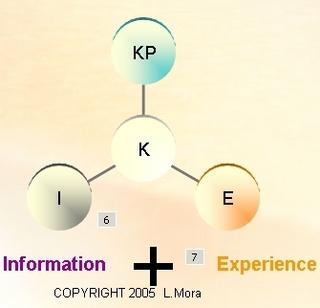The Basic Concepts

Gary Klein observed in his book How people make decisions (MIT Press,1999) that project managers rarely have enough information and time to make decisions (Using methodologies) work. They have four things: experience, intuition, training and each other. He thought they make good decisions by maximizing those elements. He mentions the two types of knowledge --rational and intuitive, and experience/training or education plus each other (Collaboration) as the way you can make decisions based on all the knowledge available.
Rational Knowledge
In very simple and practical terms, knowledge is INFORMATION plus (+) EXPERIENCE (T. Davenport et al., 1998). This means both k=i+e. To be useful knowledge (K), information and experience needs to be shared with others; in the diagram below only when you combine information + experience + collaboration or K=D+P+C, is when you get useful and actionable knowledge. In other words, you can learn something new, but how useful it is or not and how accurate it is depends if you are the only one that knows about it. Knowledge is only useful to humanity in the degree you share (it) and collaborate with others. The more you collaborate and receive feedback, the more complete (Proof and Wisdom) that knowledge will be.
If we come to agree on the elements, from the IT perspective, we can transform the concept into a real software application that will transform the way we work today.
Information: The principal component of it is DATA. As you know data does not tell you much individually. But if you take a bunch of it, and in general the bigger amount the better, and apply a process to it --Call it operation,process, etc--- you get as a result information. You get something a lot more valuable about what the pattern of the data is trying to tell you. This is in what information means as opposed as other definition equaling information with knowledge. Is only part of it.
Experience: means doing, going through a process or practicing the theory learnt through study. One key aspect of experience is that you have to be willing to go from start to finish on a defined process in order to gain full experience (A partially completed process does not mean you gained experience). Lets take riding a bike to the top of the mountain as the analogy. If you try to cheat or get tired, you will not gain 100% experience on the goal, cause the process defines you have to go from the bottom to the top, so here we define experience as completing 100% of a given process.
Learning by doing is one of the strongest ways of gaining insight meaning the brain will record "vividly" and you will remember about it more easily than when you read a book. The reason: Our brain records experiences in more detail because our body is involved instead of just the mind.
"In plain words, rational perception entails accepting and believing only what is true based on one's study, observation and experience. The knowledge derived through such an approach is rational knowledge. It should be pointed out that the process of attaining rational knowledge begins by having an open mind and by giving up blind faith and notions prevalent in society", by Jainism.
Other knowledge concepts which are similar. Knowledge is "information combined with experience, context, interpretation, and reflection. It is a high-value form of information that is ready to apply to decisions and actions." T. Davenport et al., 1998 "the insights, understandings, and practical know-how that we all possess – is a fundamental resource that allows us to function intelligently." Wiig, 1996.

<< Home